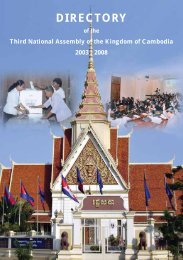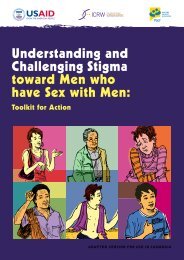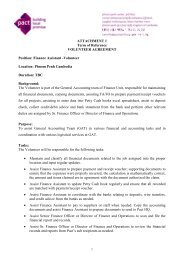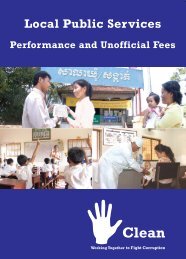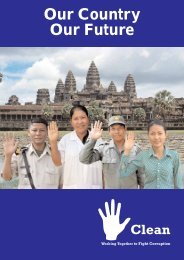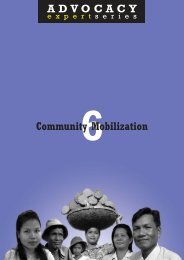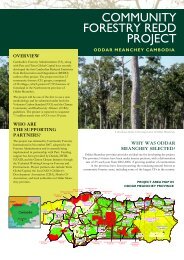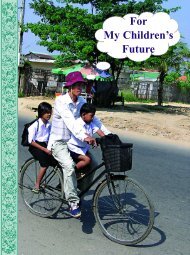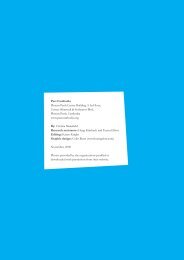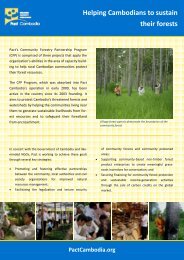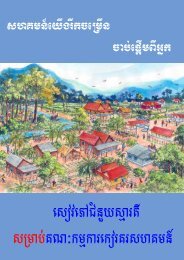Advocacy in Cambodia: Increasing Democratic ... - Pact Cambodia
Advocacy in Cambodia: Increasing Democratic ... - Pact Cambodia
Advocacy in Cambodia: Increasing Democratic ... - Pact Cambodia
Create successful ePaper yourself
Turn your PDF publications into a flip-book with our unique Google optimized e-Paper software.
8Increas<strong>in</strong>g <strong>Democratic</strong> Space<br />
and importance of advocacy for long-term<br />
susta<strong>in</strong>able development. The non-voluntary<br />
orig<strong>in</strong> of NGOs and associations and the<br />
nascency of the advocacy movement have<br />
important implications for advocacy <strong>in</strong><br />
<strong>Cambodia</strong>.<br />
Political Context<br />
The political context at the national level<br />
is reasonably open, especially when compared<br />
to other Southeast Asian countries. Change at<br />
the local level is occurr<strong>in</strong>g more slowly,<br />
particularly with regards to the political culture,<br />
although this could change with the recent<br />
election of Commune Councils. National<br />
elections were held <strong>in</strong> 1993 and 1998 and<br />
freedom of expression and association are<br />
<strong>in</strong>cluded <strong>in</strong> the new Constitution. The<br />
transition from a centrally planned system to<br />
a decentralized democracy has had its positive<br />
aspects, <strong>in</strong>clud<strong>in</strong>g the establishment of an<br />
elected government, economic growth, and<br />
human resource development.<br />
A number of sound laws have been passed<br />
s<strong>in</strong>ce the early 1990s. However, the executive,<br />
legislative, and judiciary systems are still<br />
vulnerable to f<strong>in</strong>ancial and political pressure,<br />
mak<strong>in</strong>g enforcement of laws weak. Ord<strong>in</strong>ary<br />
citizens have little recourse to the judiciary and<br />
the rights guaranteed by the Constitution are<br />
neutralized by fear created by powerful figures.<br />
There is a grow<strong>in</strong>g concern that <strong>in</strong>sufficient<br />
precautions were taken <strong>in</strong> the liberalization of the<br />
<strong>Cambodia</strong>n economy.<br />
Of greater concern is the apparent lack of<br />
political will to uphold the rule of law, attributed<br />
to the fact that popular representation does not<br />
occur at all adm<strong>in</strong>istrative levels (notably the<br />
prov<strong>in</strong>cial and district levels). The government has<br />
not prevented powerful figures from transform<strong>in</strong>g<br />
their political power <strong>in</strong>to economic power, such<br />
as questionable acquisition of land and other<br />
natural resources by political figures.<br />
For example, accord<strong>in</strong>g to Oxfam Great<br />
Brita<strong>in</strong>’s Land Study Project report of September<br />
2000 entitled Mak<strong>in</strong>g the Poor More Visible:<br />
Landlessness and Development Research,<br />
landlessness <strong>in</strong> <strong>Cambodia</strong> <strong>in</strong>creased from about<br />
2.48% <strong>in</strong> 1984 to about 13% <strong>in</strong> 2000, ma<strong>in</strong>ly<br />
because of the privatization of commonly used<br />
resources such as forests and wetlands. Legal Aid<br />
of <strong>Cambodia</strong> conservatively estimates that<br />
100,000 people are currently be<strong>in</strong>g displaced by<br />
more powerful figures. With such disturb<strong>in</strong>g<br />
figures, advocates may wonder for whom has the<br />
country been liberalized and how current trends<br />
will affect the future stability and economic growth<br />
of the country.<br />
Local<br />
villagers<br />
depend<br />
on<br />
<strong>in</strong>come<br />
made<br />
from<br />
tapp<strong>in</strong>g<br />
res<strong>in</strong><br />
trees<br />
like<br />
this<br />
one <strong>in</strong><br />
Kratie<br />
prov<strong>in</strong>ce. Increas<strong>in</strong>g forest concessions and<br />
privatization of forest lands risks villagers’<br />
livlihoods.<br />
Most developed nations have a sizable<br />
educated middle class that makes up about twothirds<br />
of the population and has a stabiliz<strong>in</strong>g effect<br />
through balanc<strong>in</strong>g political, economic, and social<br />
powers. The rema<strong>in</strong><strong>in</strong>g population is usually<br />
evenly distributed between the upper and lower<br />
classes. As <strong>Cambodia</strong>’s middle class is just barely<br />
emerg<strong>in</strong>g, the country does not benefit from this<br />
central stabiliz<strong>in</strong>g factor. Before the liberalization<br />
of the economy, the population tended to be<br />
homogenous. Now however, there is a grow<strong>in</strong>g gap<br />
between rich and poor to such an extent that land<br />
and other disputes are <strong>in</strong>creas<strong>in</strong>gly difficult to<br />
reconcile.<br />
<strong>Advocacy</strong> is most effective when advocates<br />
can gather a critical mass of stakeholders and<br />
apply pressure on elected officials to be<br />
accountable to them. One of the difficulties of<br />
do<strong>in</strong>g advocacy <strong>in</strong> <strong>Cambodia</strong> is the fact that<br />
national elected officials are selected by the party<br />
and not elected as <strong>in</strong>dividuals. Therefore these<br />
officials are less likely to be affected by the<br />
criticism of their constituents and the possibility<br />
of los<strong>in</strong>g the next election. This situation may<br />
change at the local level with the Commune<br />
Councils established <strong>in</strong> 2002. But only if people<br />
are empowered to make Commune Councils<br />
accountable to local development needs and<br />
Commune Council members understand that they<br />
represent a constituency, can the councils act as<br />
important advocates at the local level.<br />
Some multilaterals are plac<strong>in</strong>g conditions on<br />
loans to the government that demand a<br />
consultative process with the NGO and private<br />
sectors for policy formation. A consultative<br />
process has not been fully embraced by the



